The Environmental Insight column is new to Gibraltar Insight this month and will give information about environmental issues in Gibraltar and further afield, and share ideas and resources to help us live more sustainable lives and engage with continuing efforts for change, for lots of little bits of effort add up to a significant impact. Gibraltar has an amazing and unique ecosystem, and we want to help protect it in any way we can.
Recycling in Gibraltar
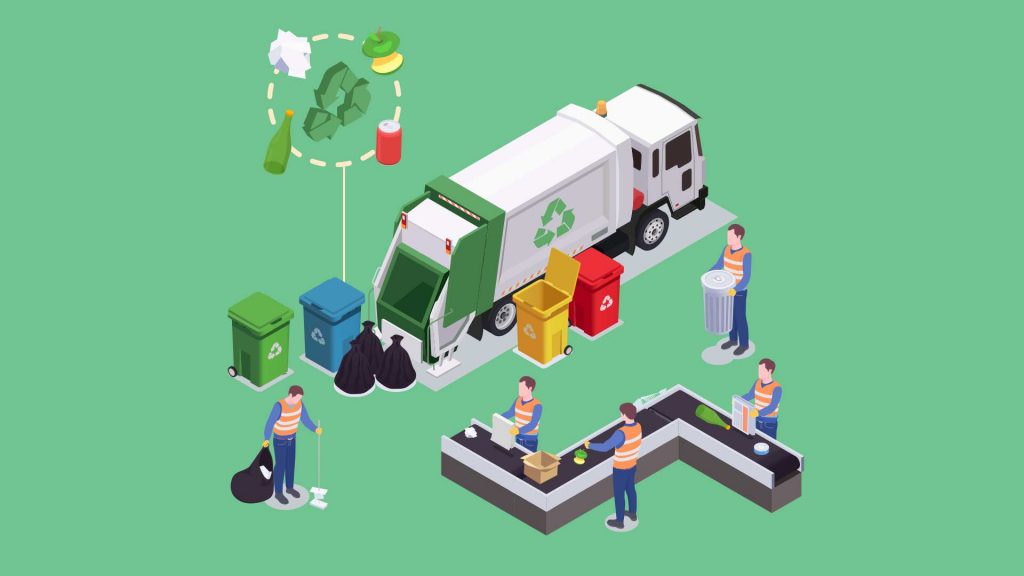
I’ll be honest, when I came to Gibraltar I was surprised to learn that recycling isn’t collected door to door, though when you spend time here you realise that this may not be practicable with largely apartment living. However, only a small percentage of the population actively recycle, and otherwise environmentally aware people confess time and again that they don’t. Delving a little deeper into this, (and it is anecdotal evidence) you hear lots of resistance seems to be because the bins are not accessible and there’s a widely held belief that recycling in Gibraltar isn’t actually recycled. Now this isn’t about guilting people, but I was curious to learn if I was actually just wasting energy, bagging up recycling and walking it to the nearest recycling bin and keen to learn what happens to our recycling. So, I popped down to the Eco Park just off Devil’s Tower Road, and was pleasantly surprised by what I found there and to see the wide range of recycling of almost any materials that goes on…
The ECO Park
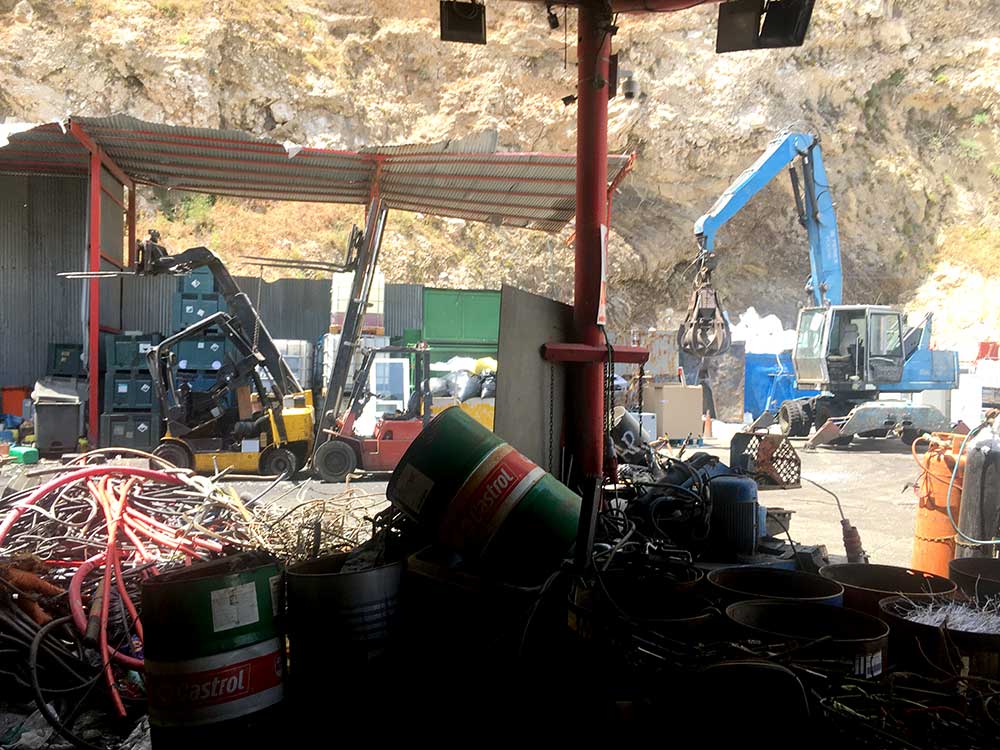
The 5 brightly coloured recycling bins that are dotted in groups around Gibraltar are emptied by Britannia on a daily basis and they bring all the waste to the Eco Park, where it gets put into its respective areas and broken down. Items are sorted in Gibraltar and then they go off to their respective places, for further separation and processing. David Drury, Foreman kindly downed tools and gave me tour of the Eco Park, which is a hive of activity. It was striking how every item gets broken into its materials. For example, copper is stripped out of cables and pipes and cut into chips; their ‘gold’ as David says, as copper fetches the best return. Items are sorted into respective areas and then treated and taken out. A criticism I have heard levied against recycling in Gibraltar was that the bins are collected into one big trough, so there was no point in bothering to post tens into the correct coloured bin when you drop it off. However this is not the case; it is collected by materials type and as the photos here show, kept in its respective groups until being taken away for deeper processing. As David says, “Why would we make so much more for work for ourselves in having to sort the waste again?” Anyone who sees collections not happening correctly is urged to report it.
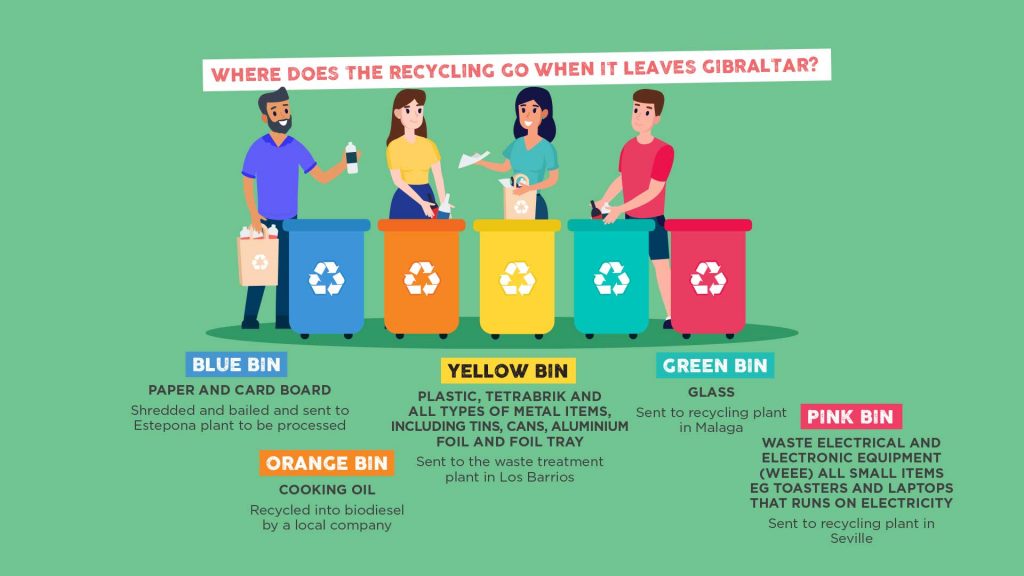
Accessibility of recycling bins in Gibraltar
There are around 300 recycling bins on 70 sites in Gibraltar. It seems there could be more bins in more locations in Gibraltar and this could remove the barriers to many in partaking in recycling. When asked about this HM GoG stated: “Plans have always been to continue increasing though we believe recycling bins are quite accessible to the majority, and that whoever wants to recycle is able to. Having said this, we are continuously working towards improving the service we provide, and always happy to take recommendations from the general public on board. Note however that there are constraints in respect to areas for the positioning of these, as well as that of accessibility to the locations for the servicing trucks.” It would be great to see more bins and we hope this will happen in future. It is encouraging to learn from the Department of the Environment, Sustainability, Climate Change and Heritage that there is already a requirement as part of the Building Application process for new builds to supply their own recycling bins, which would in turn be serviced by HM GoG. However, it is unclear as to when it is going to be enforced that recycling bins will be installed in bin stores within new buildings.
Why bother to recycle anyway?
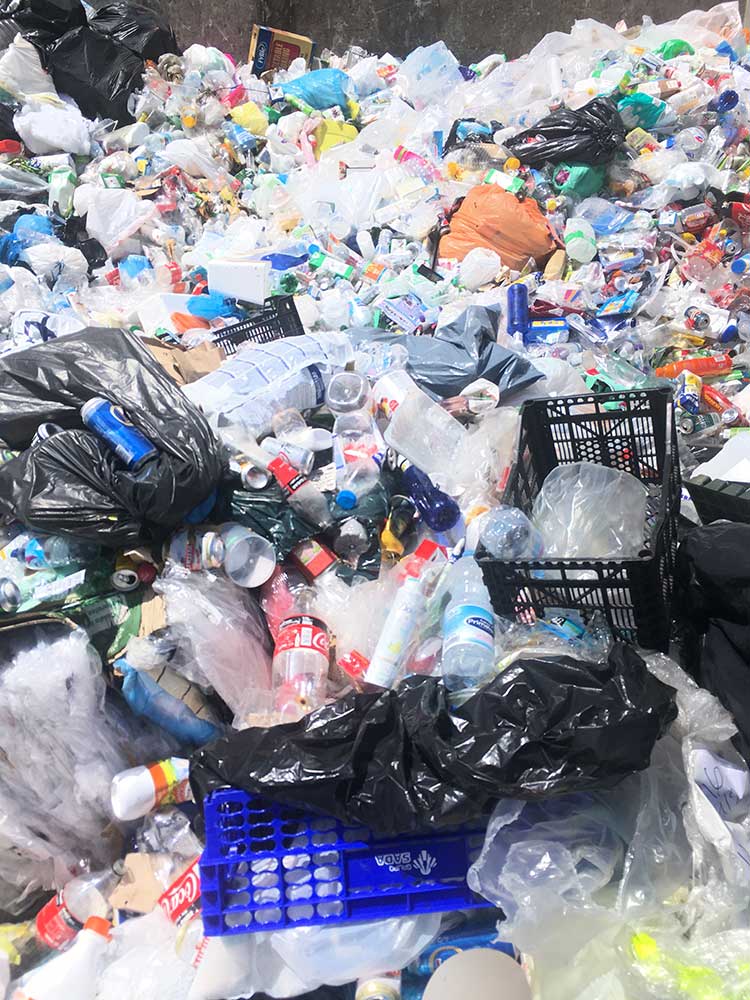
The best thing is of course to avoid single-use plastics and items if you possibly can, by making the switch to reusable drinks bottles and containers and so on. If you do use single use items, then the next best thing is to recycle them.
If you just throw your rubbish into the usual trash, it will go into landfill. From there it will take between 400-1000 years to degrade. In the process of doing that, it break down into methane-releasing waste which will make its way into the ground water; so we will gradually pollute our waterways in addition to the micro plastics that are already infecting the water supplies.
Also, much of the waste doesn’t actually stay in the ground as the landfill sites become eroded over time by rain, animals or birds, and items get blown away and ends up hundreds or thousands of miles away, polluting coastlines and waterways and becoming a problem for everyone. According to the World Economic Foundation, “32% of the 78 million tons of plastic packaging produced annually is left to flow into our oceans; the equivalent of pouring one garbage truck of plastic into the ocean every minute. If we carry on as usual, this is expected to increase to two per minute by 2030 and four per minute by 2050, meaning there will be more plastic than fish in the world’s oceans.” These are horrifying projections and the fact that only 14% of global plastic packaging is collected for recycling presently, make it clear that we all need to do more.
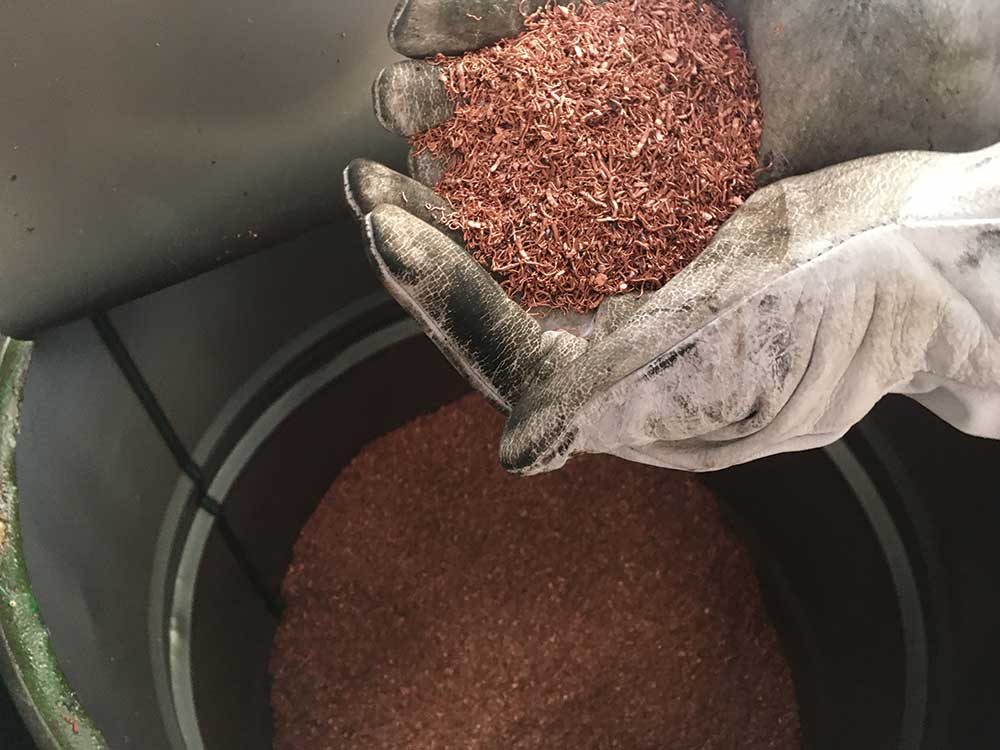
In addition to this, the natural resources of the world are of course finite, so recycling items such as plastic metal, glass or paper means that less of these are used. Not only that, raw materials have to be extracted (mined, quarried or logged), refined and processed all of which creates substantial air and water pollution. Recycling on the other hand saves energy: producing new aluminium from old products (including recycled cans and foil) uses 95% less energy than making new ones. The amount of energy saved from recycling one glass bottle could power an old 100-watt light bulb for 4 hours and a new low-energy LED equivalent for a lot longer, Greenpeace report. A reduction in greenhouse gas emissions helps to tackle climate change.
If we all did a little bit, that would add up to a heck of a lot, and mean that the planet will be there for our grandchildren to enjoy. The situation really is that stark. We have ten years to change things or the climate will be irreversibly changed. As General Assembly President María Fernanda Espinosa Garcés (Ecuador) warned the UN last March: “we are the last generation that can prevent irreparable damage to our planet.”
We would be interested to hear any of your comments or feedback about recycling, so please do get in touch: hello@gibraltarinsight.com








